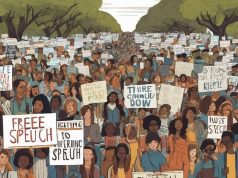The violent quota agitation in Gujarat is being spearheaded by the Patidar Anamat Andolan Samiti (PAAS).The spirit of democracy in this context is almost a well-executed joke. The Patels account for just 12% of the state’s population, while OBCs, SCs and STs make up 78%. The Patel as a community has been landowners, village leaders and a generally affluent caste. Patels dominate pharmaceutical, chemical, medical, plastic, building construction, ceramic and diamond industries in Gujarat. The momentum that has been gathered by the young leader Hardik Patel proves yet again that massive public support and an invincible ally of penetrable words can carry any movement forward, irrespective of whether it is logical or not.
The age-old hue and cry about whether certain communities “deserve” special treatment has been harangued about enough. Pragmatically speaking, the state government has said that the 1992 Supreme Court verdict limits reservation provision up to only 50% in any state. According to sources, Gujarat has 27% reservation for OBCs and 15% and 7% for STs and SCs respectively, which clearly makes it impossible for the state to keep handing out reservations to every community that makes the demand. No matter how vociferous the demands are, there are certain decorum and practices that need to be remembered.
It can be said that the fear of a clash between the different castes is presumably what is prompting the state government to maintain high security for the Patel agitation. These sorts of negative outbursts are threatening because the livelihoods of the working class and the common people are at stake. The controversy triggered by the ongoing reservation movement has created a situation of unease in society.
This question that agitation raises is whether the OBCs deserve this special privilege when the aforementioned community’s “meritorious” students have to go abroad to utilize their potential, as seats are being handed out to backward classes and their undeserving counterparts. Yes, this does sound unfair, but where was this argument when centuries of oppression made those classes of people incapable of even dreaming of an education?
Moral reasoning creates in all of us a sense of empathy pleas of help, but in this situation, help for what? Who is the one asking for help? An endlessly dominant and affluent community that just wants equality? At the cost of what? What exactly is the criteria here, other than unfulfilled political dreams that need a bit of situational fuel?
While some believe that Hardik is ambitious and using the agitation to realise his political ambitions, he denies any political involvement. The PAAS and the Sardar Patel Group, another organisation of Patels, have held 107 rallies in the state at the city and tehsil headquarter-levels since July 6, when the first Patel rally was staged in Mehsana. Even the smallest rally has seen participation of 5,000 to 10,000 people, and the total participation to date is estimated to be around 2 million-nearly 17% of the Patel population, and about three or four per cent of the state’s residents. These staggering statistics about just how passionate the Patel community is about gaining momentum could put the various communities at loggerheads.
Despite denials by Hardik Patel and others about any political affiliation to the ongoing protests, the way the whole agitation has taken shape indicates the presence of political leaders in their camp.
It is being said in the political circles that some of the leaders sidelined first by Modi and then his protege Anandiben, are the ones behind this massive outburst. The state government now lacks the authoritarian pragmatism of the Modi government. The burgeoning consolidation of the community could be a source of an unprecedented disaster for the state.
The spirit of democracy lies in equal opportunities for each of its individuals and a sense of socialist responsibility towards the ones who have been victimised. And though one cannot deny the growing need to immediately reform the laws and make them better suited to today’s environment, unnecessarily burdening the state government with a catastrophic political drama so as to gain momentum for clearly non-socialist motives does not endorse the spirit of equality at all.






